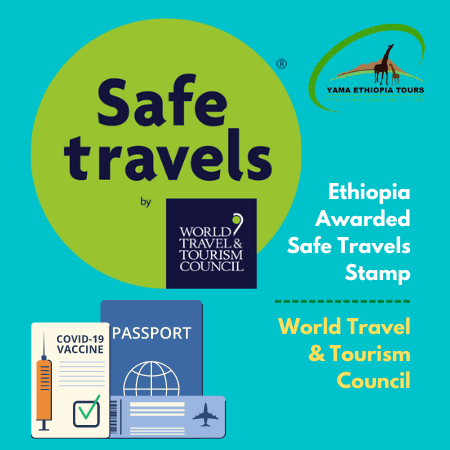Yama Ethiopia Tours - WTTC
'Safe Travels': Global Protocols & Stamp for the New Normal
WTTC alongside our Members, governments, health experts, and other industry associations are working together to achieve effective recovery protocols by developing meaningful action plans that optimise sector-wide recovery efforts. Part of our protocols includes providing the public & private sectors with insights & toolkits for interaction & implementation to ensure that people are and feel safe however WTTC, our members, and the sector can not guarantee 100% safety. It is paramount to have common rules. Ultimately, we envision a future of travel that is safe, secure, seamless and provides an authentic and meaningful experience to the traveller across the journey; one which supports the livelihoods of millions and contributes to sustainable economic growth.
The protocols align the private sector behind common standards to ensure the safety of its workforce and travellers as the sector shifts to a new normal. The SafeTravels Stamp was created for travellers to recognise destinations and businesses around the world which have adopted the SafeTravels health and hygiene global standardised protocols. Please note that while the protocols take into account current WHO and CDC guidelines, they are living documents which we will update as new information becomes available about COVID-19.

TOURISM AND CORONA VIRUS (COVID-19)
Ethiopia has removed the quarantine requirements for travelers who can show proof of a negative pre-travel molecular based COVID-19 test result. Travelers who can show proof a negative test result taken within 72 hours before departure will not have to quarantine. Travelers who can show proof of a negative test result taken within 5 days of departure will not have to quarantine, but will be retested at the airport.
TRAVEL PROTOCOL UPDATE COVID-19 IN ETHIOPIA
Guests will need extensive information and briefings on the COVID-19 protocols. Easy to understand and assimilate information must be provided in rooms, on the backs of vehicle seats, at reception desk and check-in/pick-up counters, on tables, notices by lifts, etc. Notices attached to walls, seats, tables etc., are preferable to avoid contamination by touch. Apps and other electronic information provision can also be used to minimize touch. For first arrival/check-in/boarding of vehicles etc., standard briefings should be made to all GVPCs similar to current airline safety briefings. The information and briefings must emphasize that all measures are for guest and staff safety, and cover:
For more information please visit the following online resources:
TOURISM AND CORONA VIRUS ( COVID-19 )
The outbreak of Coronavirus COVID-19 presents the tourism sector with a major and evolving challenge.
The World Tourism Organization (UNWTO) has strengthened its collaboration with the World Health Organization (WHO). UNWTO calls for solid international leadership and for tourism to be included as a priority in future recovery efforts.UNWTO also calls upon the sector and travelers to address this challenge with sound judgment and proportionate measures. Tourism is currently one of the most affected sectors and UNWTO has revised its 2020 forecast for international arrivals and receipts, though emphasizes that such any predictions are likely to be further revised.
Against a backdrop of travel restrictions being introduced, UNWTO underscores the importance of international dialogue and cooperation and emphasizes the COVID-19 challenge also represents an opportunity to show how solidarity can go beyond borders. The tourism sector, like no other economic activity with social impact, is based on interaction amongst people. UNWTO has been guiding the tourism sector’s response on several levels.
SOURCE : UNWTO
